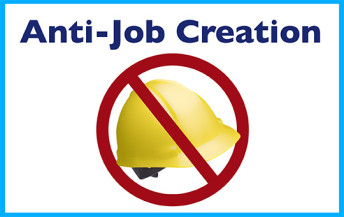Pat McGeehan has written another article against forced pooling, or “lease integration” or “fair pooling”, as it is also being called. He makes a number of good points, all of which could be turned into articles of their own. I’d like to take some time to address one particular point.
The proponents of forced pooling say that it will be a job creation bill. I was surprised when I heard that. It had never occurred to me that the forced pooling bill would create jobs. Having thought about it some, I’m still of the opinion that the forced pooling bill will not create jobs. Maybe it’s because I’ve worked in several different capacities in the industry, so I have a better idea of what jobs there are and the forces that drive creation of those jobs, but I simply don’t see how this will create jobs.
What forced pooling does do is make it easier to put together drilling units, making it faster and easier to drill and faster and easier to produce. One could say that that means there will be more jobs, as there will be more drilling, but it’s not ease of creating units that slows down or speeds up drilling. It’s the price of oil and gas that increases and decreases drilling. No bill making it easier to put together drilling units is going to affect oil and gas jobs the way demand does. In fact, one could argue that forced pooling will increase supply due to increased drilling, thus driving down demand.
 One could also argue that forced pooling will decrease jobs due fewer landmen being needed to put together drilling units.
One could also argue that forced pooling will decrease jobs due fewer landmen being needed to put together drilling units.
So I don’t see forced pooling as a job creation bill. I do, however, see it as a profit creation bill. Easier creation of units means less expense in development, and less expense means more profit. I don’t have anything against profit, a company has to make a profit to be able to stay in business. I simply dislike characterizing a legislative bill as a job creation measure when it’s actually a profit creation measure.
